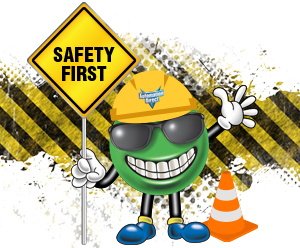- November 3, 2024
- Posted by: admin
- Category: Updates

“At the end of the day, the goals are simple: safety and security.” Jodi Rell. We absolutely agree with her. An Industry can only function properly when its workers feel safe and secure.
INDUSTRIAL SAFETY GUIDELINES
Industrial Incidents are inevitable and sometimes happen unexpectedly. This is why it is advisable for managers to have special procedures put in place for its prevention. For this reason, a few guidelines are necessary to develop policies for industrial safety.
- Only competent and authorized personnel should enter the factory and use equipment.
- A reference document that succinctly explains the rules and regulations guiding the factory should be made available, and every member of staff must have their own copy. It does not end at that. Another document containing the list of machines and equipment, and their usage/maintenance should be provided for the workers; to serve as a go-to reference whenever they need relevant information.
- Food and liquid items should not be allowed inside the factory, a canteen should be provided. Smoking should be done in designated areas only.
- Workers must always be in their personal protective equipment.
- Factory materials should be clearly labelled to avoid confusion and further harm.
- There should be provision of effective hygiene management resources (e.g. hand washers, washing machines, etc.).
- Proper ventilation should be provided where applicable.
- Pits within the field should be properly covered.
INDUSTRY SUPERVISION TIPS FOR INCIDENT PREVENTION
Supervision is a mandatory requirement for workers deployed to industrial environments. A supervisor has to be in charge of the environment and be held accountable for managing the safety culture of workers on duty. This includes making sure that all workers strictly adhere to safety rules and regulations.
Most of the time, industrial incidents are avoidable. If certain steps are taken, they can be prevented.
Now, here are some important tips for preventing industrial incidents.
- Organizing Mock Security Drills: These are practices designed to prepare workers against emergencies if any. We believe that when workers are drilled constantly, industrial hazards are prevented from occurring.
- Wearing Personal Protective Equipment (PPE): This is very important so there should be provision for appropriate PPE and every factory worker should be entitled to a set of safety gears. The safety gears include but are not limited to gloves, boots, hard hats, coveralls, safety glasses etc.
- Provision of Fire Extinguishers: The availability of fire extinguishers is very essential in industrial environments, in case of fire outbreaks. Factory or Construction workers should be trained on the usage of the different types of fire extinguishers; for instance, if a worker is uninformed, he could make the mistake of using a water fire extinguisher for an electric fire. Whereas, ‘water fire extinguishers’ are used for fires that occur on wood, textile, and paper, while ‘carbon dioxide fire extinguishers’ are ideal for electrical fires.
- Inspection of Equipment and Environments: A checklist for carrying out thorough inspection of industrial tools and equipment is necessary. The safety inspector will inspect the equipment to ensure they are in good working conditions, before being used by the workers. Service records of industrial machines and equipment should be maintained as well. Apart from inspecting industrial equipment, the environment should also be frequently inspected. Industrial materials that are no longer used or needed should be retired.
- Easy Access to Emergency Exits: Make no room for clutters. Ensure that there is free and easy access to emergency exits from several parts of the industrial environment. Cluttered or obstructed exits might make an escape to be difficult. During a drill or accident, every worker should gather at the Muster Point for headcount.
